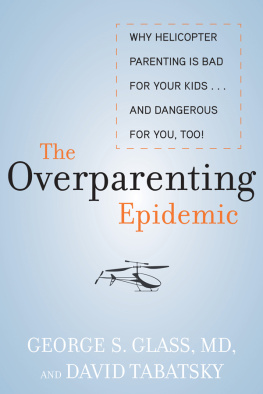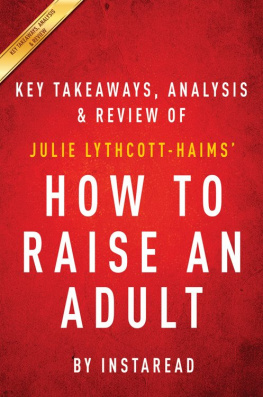George S. Glass - The Overparenting Epidemic
Here you can read online George S. Glass - The Overparenting Epidemic full text of the book (entire story) in english for free. Download pdf and epub, get meaning, cover and reviews about this ebook. year: 2014, publisher: Skyhorse, genre: Children. Description of the work, (preface) as well as reviews are available. Best literature library LitArk.com created for fans of good reading and offers a wide selection of genres:
Romance novel
Science fiction
Adventure
Detective
Science
History
Home and family
Prose
Art
Politics
Computer
Non-fiction
Religion
Business
Children
Humor
Choose a favorite category and find really read worthwhile books. Enjoy immersion in the world of imagination, feel the emotions of the characters or learn something new for yourself, make an fascinating discovery.
- Book:The Overparenting Epidemic
- Author:
- Publisher:Skyhorse
- Genre:
- Year:2014
- Rating:4 / 5
- Favourites:Add to favourites
- Your mark:
- 80
- 1
- 2
- 3
- 4
- 5
The Overparenting Epidemic: summary, description and annotation
We offer to read an annotation, description, summary or preface (depends on what the author of the book "The Overparenting Epidemic" wrote himself). If you haven't found the necessary information about the book — write in the comments, we will try to find it.
The Overparenting Epidemic — read online for free the complete book (whole text) full work
Below is the text of the book, divided by pages. System saving the place of the last page read, allows you to conveniently read the book "The Overparenting Epidemic" online for free, without having to search again every time where you left off. Put a bookmark, and you can go to the page where you finished reading at any time.
Font size:
Interval:
Bookmark:


Copyright 2014 by George S. Glass and David Tabatsky
All rights reserved. No part of this book may be reproduced in any manner without the express written consent of the publisher, except in the case of brief excerpts in critical reviews or articles. All inquiries should be addressed to Skyhorse Publishing, 307 West 36th Street, 11th Floor, New York, NY 10018.
Skyhorse Publishing books may be purchased in bulk at special discounts for sales promotion, corporate gifts, fund-raising, or educational purposes. Special editions can also be created to specifications. For details, contact the Special Sales Department, Skyhorse Publishing, 307 West 36th Street, 11th Floor, New York, NY 10018 or .
Skyhorse and Skyhorse Publishing are registered trademarks of Skyhorse Publishing, Inc., a Delaware corporation.
Visit our website at www.skyhorsepublishing.com.
10 9 8 7 6 5 4 3 2 1
Library of Congress Cataloging-in-Publication Data is available on file.
Cover design by Brian Peterson
Print ISBN: 978-1-62873-730-1
Ebook ISBN: 978-1-62914-082-7
Printed in the United States of America
CONTENTS
A QUICK-START GUIDE
F or parents living in a perpetual time crunch (arent we all?) or simply saddled by a severe lack of concentration (perhaps caused by overparenting), we suggest an abbreviated version of this book. If your time and patience are limited, here is what we recommend, in this order:
: Our disclaimer. All levity aside, no single book can consider every childs special needs or the exact circumstances of any individual family.
: The glossary. Skim through this, and if you recognize yourselfand admit itit may behoove you to abandon this page altogether and read the entire book.
: From the introduction: If we never give our children permission to get things wrong, theyre unlikely to ever learn how to get things right. Is this starting to make any sense?
: Overparenting occurs when someone tries too hard to manage the outcome of his or her childs life, imposing his or her own expectations, often inappropriately, regardless of the childs wishes and abilities.
: How Do You Know whether You Are Overparenting? If you answer yes to some of the descriptions, find a comfortable chair and take notes. You obviously have a lot to learn.
: Mindful ParentingThis is key to everything.
: Managing ExpectationsOh, boy, dont we all need help with that?
: Parental Aptitude TestSame as above. Keep that comfortable chair handy.
: How Overparenting Affects Your ChildThis should make any parent curious.
: How Overparenting Affects You as a ParentAfter all, its all about you, isnt it? Youre thinking about that... pretty sure you are. Gotcha! Its not about you. Its because of you. This book exists because of you! Ready or not, please proceed.
DISCLAIMER
W e understand that parents of special-needs children must often pay special attention to an assortment of needs and conditions, and that some of our comments and prescriptive ideas may not be relevant to their situation. We must also recognize that for most of us, our own child (or children) may be considered to be special-needs; because we understand our childrens individual needs and unique situation more than anyone else, we think that they should get special if not extra attention or care from the powers that be, at school or through the lens of a doctor.
For example, some parents want their child to be labeled as having attention-deficit/hyperactivity disorder (ADHD) so that they can get extra time on tests. Others would like to explain their childs shyness as a product of Aspergers syndrome so that they dont have to push the child to go out and become involved with his or her peers. Before anointing or accepting a special-needs label or diagnosis, your child should be evaluated by an expert in that field to truly determine what is going on and what the best course of action may be.
Note
The name, occupation, and geographic location of some of the individuals depicted in this book are composite portraits reflecting real people, whose specific identities have been protected. These anecdotal quotes have been culled from interviews and/or personal correspondence conducted by the authors, from personal peer groups, professional associations, and confidential doctor-patient communications. Pseudonyms have been given and in some cases the quotes may be composites of the words of a variety of interview subjects. A complete list of those who have been interviewed and/or personally corresponded with appears in the Acknowledgements.
GLOSSARY
Note: This list is alphabetical, so as not to reveal any personal history of the authors, both of whom are parents.
Blackhawk moms
Helicopter parents in attack mode, who will do anything to ensure their childs success, regardless of the consequences for anyone else. (First cousin to cheerleader moms.)
Crispy kids or toasties
Children burned out by the time they get to college.
Curling parents (used in Scandinavia and some other parts of Europe)
Parents who sweep obstacles out of the way for their children.
Helicopter parents
Moms and dads who just cant stop hovering over their kidsat any age.
Hyper parents
Parents who are prone to overscheduling their kids.
Lawnmower parents (a.k.a. snowplow parents)
Parents who attempt to remake terrain so that it works better for their child.
Parent bouncers
University-hired students trained to redirect adults who try to attend their childrens classes and activities.
Satellite parents
Helicopter parents only from a distance, such as on cell phones and with video monitors.
Smothering mothering
Does this really need to be explained?
Soccer mom
An overly involved parent who tends to forget her own life.
Stealth parents
Parents who are there, still intervening, even though you cant see them.
Submarine parents
Moms and dads who undermine their children.
Teacup kids
Children who dont function well without their parents assistance.
INTRODUCTION
W e love our children. We want the best for themwhatever that may be. We want to be sure that they will have every opportunity in this world to succeedhowever we may define success. In fact, we often try to do everything we possibly can to guarantee that our children will have every chance to attain every level of success. That means that we want to provide them with the means to match or surpass ustheir parentsand the lifestyle they have experienced growing up.
So what might that look like for todays parents? What guarantees our success in raising a new generation of wonderful children, destined to make this world a better place? Because there is no definitive guide, whats a parent to do if he or she wants to do an effective job of raising his or her child? Unfortunately, no university features a Department of Parenting, teaching young adults the skills that they will need to negotiate parenting in the twenty-first century. Theres no such thing as student parenting, and nothing that compares to student teaching, which is necessary for anyone pursuing a formal career in education. In the United States, we have no government agencieson federal, state, or local levelsthat require new parents to accrue any knowledge that will help them raise healthy, safe, and responsible children. And because babies dont arrive with an owners manual, the eventual lessons that we learn as parents often make themselves clear only after our experience of raising children occurs. By the time we are capable of passing on parenting lessons to our children, they are often grown and not so interested in listening to us tell them what we did or didnt do correctly.
Font size:
Interval:
Bookmark:
Similar books «The Overparenting Epidemic»
Look at similar books to The Overparenting Epidemic. We have selected literature similar in name and meaning in the hope of providing readers with more options to find new, interesting, not yet read works.
Discussion, reviews of the book The Overparenting Epidemic and just readers' own opinions. Leave your comments, write what you think about the work, its meaning or the main characters. Specify what exactly you liked and what you didn't like, and why you think so.











